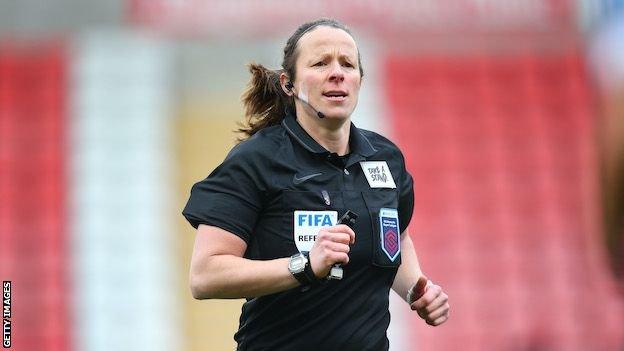Stacey Pearson: WSL referee on 'postcode lottery' for IVF funding for same-sex couples
- Published

Stacey Pearson is a referee in the Women's Super League
Women's Super League referee Stacey Pearson has spoken out about the financial and emotional challenges facing same-sex couples trying to access NHS-funded IVF treatment in England.
Pearson and her partner Danielle Beazer have a daughter, who was born in 2018.
But three attempts at having a second child have been unsuccessful, with the couple experiencing two miscarriages and a failed IVF cycle.
Now the pair, who have spent about £17,000 of their own money on private fertility procedures, want to draw attention to what they're calling a "postcode lottery" in NHS treatment.
'I knew something was wrong when she didn't ring me straight away'
"Family comes first and for the last two years, we have been trying to add to ours," Pearson tells the BBC's LGBT Sport Podcast.
After a failed IVF cycle in October 2019, Beazer became pregnant in spring last year. But at the seven-week scan, she found she'd had a miscarriage.
"Danielle went to Cardiff because the clinic in Bristol was closed due to Covid," Pearson remembers.
"I knew something wasn't right when she didn't ring me straight away, and they unfortunately said Danielle had miscarried."
Pearson says it took her and Beazer 10 months to work through the pain of that miscarriage.
At Christmas, they decided to pay for another round of IVF - but after a successful frozen embryo transfer, Beazer had a second miscarriage in March.
"You always think 'surely it can't happen to us twice?'" Pearson says.
"Obviously, it did - and while physically it's probably worse this time, we both thought we're ready to talk about this now."
'We just want to raise awareness'
The couple have now started a blog, external to share the story of their IVF journey.
"It wasn't until we did a little research that we realised how little support there was for same-sex couples having IVF in England," Pearson says.
"There are IVF guides and there's information that the clinics give you, but in terms of same-sex couples, it's just not as readily available."
It's not just emotional support that Pearson feels is lacking.
The provision of NHS fertility treatment in England is decided locally by clinical commissioning groups.
That follows guidelines set by the National Institute for Health and Care Excellence (NICE), which says opposite-sex couples may be considered for IVF on the NHS after two years, if they've been unable to conceive through intercourse.
Same-sex couples may be eligible for the same NHS treatment, but only after showing they've been unable to conceive six times through artificial insemination.
NICE says the criteria are a way of achieving equivalence between opposite-sex and same-sex couples when it comes to infertility, while the Department of Health says the current guidelines are the most clinically and cost-effective.
But Pearson argues it doesn't account for the fact that same-sex partners have to pay for up to six rounds of IVF from their own pockets.
"It's more expensive than you think it is," she says.
"To have a full cycle is probably between £4,000 and £5,000, and that doesn't always include the drugs you need to be in the best state possible to transfer the embryos back in.
"It cost us in the realms of £1,600 to £2,000 a time to get sperm shipped over here as well, and we've had to do that three times. So it all adds up - and if that first try was maybe on the NHS instead, it would be slightly easier financially for us.
"We're lucky that we both have jobs and that we've saved money to do it. But there might be other couples out there that don't have the financial means to start a family, but would be the best parents.
"I don't see how it's fair not to at least give them a shot."

Dragons' Den returns: A new series of eager entrepreneurs hoping to strike the deal of a lifetime
Your film night sorted: Epic films for you to choose from this Easter weekend
